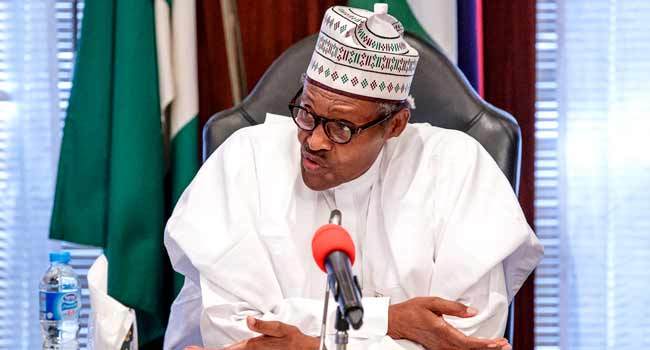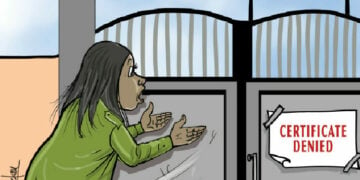Those who threw stones around during the recent visit of President Muhammadu Buhari to Katsina State and later Kano State have, by their act, made a statement that has already been subjected to varying analyses. The act was a clear expression of disapproval of some of the policies of the federal government, particularly the naira redesign which has caused noticeable hardships to Nigerians.
Having been so pelted in his home state, Katsina, and Kano State which used to be his unrivalled support base, President Buhari must have now realized that he has lost the most critical portion of his sphere of influence. What the people in those states demonstrated was an outright rejection of a leader they once unconditionally supported on account of the belief that he was there fully for them.
The attacks would not have been such a big news had Buhari not been the target or if they had happened in some other places than Katsina and Kano. There, arguably, can not be a clearer evidence that the relationship between the president and the places or states over which he, hitherto, had absolute control has deteriorated than the ease with which the youths mobilized themselves for those attacks.
Meanwhile, a lot of varying or even conflicting facts about the incidents have been significantly established, with each one of them serving as a basis of one reaction or another. The perpetration of such violent acts just some days to elections must have served diverse political interests as evident in the conflicting reactions of the Buhari’s ruling All Progressives Congress (APC) and the Peoples Democratic Party (PDP).
The swiftness with which the PDP, surprisingly, condemned the attack which it described as “outrightly treasonable and sacrilegious assault on our national sovereignty” and even further alleged that the APC Presidential Candidate, Asiwaju Bola Ahmed Bola Tinubu, was the sponsor of the act in particularly Kano was most surprising, if not shocking. By insisting, in a statement signed by its National Publicity Secretary, Honourable Debo Ologunagba, that the attack was a manifestation of Tinubu’s “plot to undermine the presidency, cause confusion, trigger violence in the country, disrupt the conduct of the 2023 general elections and derail our democracy; having realized that he can not win in a peaceful and fair electoral process”, the PDP has already turned the incident into a tool for campaign.
The PDP’s attack on Tinubu was expectedly countered by the APC Presidential Campaign Council which, in a statement issued by the Council’s Director of Media and Publicity, Bayo Onanuga, dismissed reports on the Kano incident as fake peddled by the opposition party to “cause disharmony in the APC family”. It argued that “President Buhari was warmly received in Kano State” and therefore alleged that the PDP cooked up the incident story after it failed to actualize its plan to “embarrass President Buhari in Kano and then put the blame on host Governor Ganduje and Tinubu.”
There are obviously elements of both truth and falsehood in the respective arguments of both parties as each one of them tried to manipulate almost all the facts about the incidents to serve its own interests. This means that the happenings in Katsina and Kano States have come across as perfect realities that, in one way or another, the parties have already used against each other.
But even with such a manipulation by each of the two parties, certain basic facts have stubbornly stood out and have therefore constituted a solid basis for an objective analysis of the happenings in those places. While, for example, the PDP’s accusation that Tinubu organized the attacks in Kano could not withstand any scrutiny because of the absence of evidence to support it, the APC’s argument that the incident was imaginary has remained completely unsustainable because numerous verified reports have confirmed that such an act was carried out.
Truly, the accusation by the PDP against the presidential candidate of the APC over the Kano incident was a clear display of desperation which might have validated the allegation that the opposition party planned it all in order to cause damage to the APC and its candidate. Or how else could the sympathy and even support that the PDP expressed in the statement it issued on the incident could be explained?
The APC, on its part, gave itself away by allowing certain internal squabbles to continue to characterize the inter-relationships amongst its key figures. It has since been perceived or even known that certain elements within the party, with President Buhari as the biggest of them, are yet to wholeheartedly reconcile themselves with the reality of the Tinubu’s contest for the presidency.
This means that it is the apparent mistrust between Tinubu and his adversaries within the party that has provided the basis for the PDP’s reaction to the attack on President Buhari. The Stone-throwers in Katsina and Kano States have, in other words, carried out an act that has become a weapon that PDP has begun to apply against the ruling APC.
Tinubu is a person who has the least capacity for the suppression of anger, which is the reason for his numerous outbursts and outcries. What he said recently in Abeokuta, Ogun State, about a perceived determination, on the part of his opponents within and outside the APC, to forestall his emergence as president was the same kind of complaint he made before the conduct of the party’s primaries that produced him as presidential candidate.
Even Governor Nasir Ahmed El-Rufa’i of Kaduna State, in a recent chat aired by the Channels Television, to a very great extent, agreed with Tinubu on the existence of some powerful elements in the government that are trying to ensure that the APC loses the election because “their candidate didn’t win the primaries.” This is a thinking or conclusion that has already gained acceptance in some critical quarters within and outside the APC.
The disagreements within the APC and the harsh reactions that the policies of the government have generated, all of which have continued to have crippling effects on the party and the country are extremely damaging to President Buhari. As a leader who was popularly elected almost eight years ago, it has always been expected that he will ensure that all affairs in both the party and the government are coordinated in such a way that unnecessary crises are avoided.
His failure to ensure such a coordination is what is re-enforcing the feeling that his concern for the party is negligible. Unless the situation is remedied, a lot more members of the party and other Nigerians will continue to consider President Muhammadu Buhari as an elected president who does not care about the future of the party that he used to get to where he is now.











